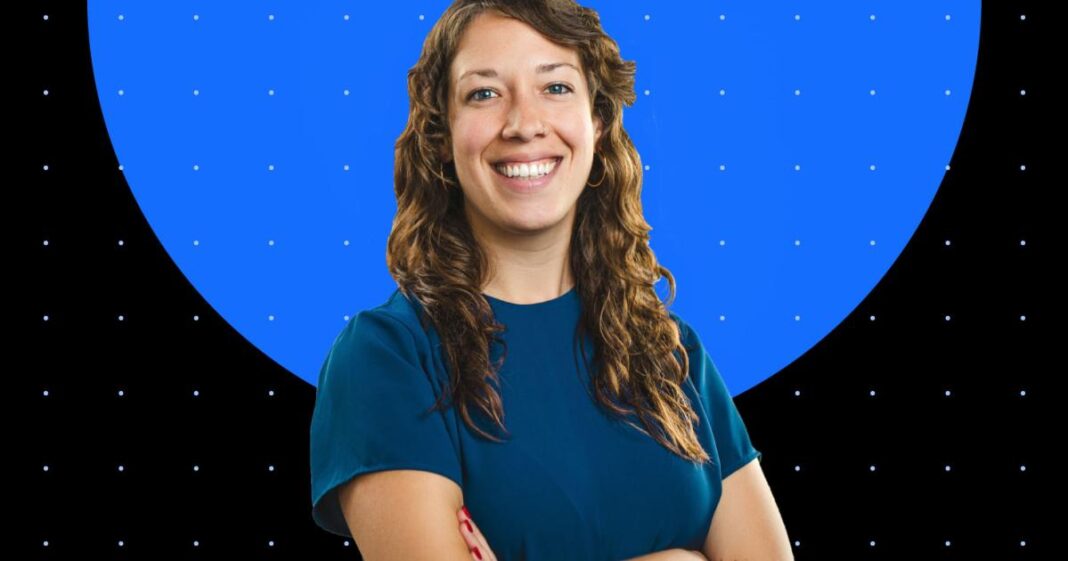The industry average carbon footprint for shoes is 14 kilograms per pair. The average for Allbirds — reported on its footwear — is half that, at 7.12 kg, the 10-year-old company disclosed in April 2023.
The San Francisco company is pushing for 5.5 kg by the end of 2025, half of where it started in 2021 when it went public. The stretch goal is “close to zero” by 2030. It’s nearly there with “M0.0nshot,” a sneaker with a production footprint of about 2 kg. Introduced last year, it will become commercially available in late 2024.
The company has embraced an eco-friendly brand vibe since its origin, often talking it up with investors. Allbirds created its carbon product labels to signal that ambition to consumers. It also uses the data to get employees and business partners thinking about the potential impact of everyday decisions — from materials to packaging to distribution — on its emissions reduction goals.
“We think about it a lot in terms of leading and lagging indicators,” said Aileen Lerch, director of sustainability at Allbirds.

Lagging and leading indicators both matter
Lerch reports to the company’s new CEO, Joe Vernachio, a veteran of brands such as North Face, Nike and Patagonia. Vernachio joined Allbirds as COO in 2021. He replaced co-founder Joey Zwillinger as chief executive in March after the company reported a precipitous decline in sales: The company lost $152 million in 2023.
Although the brand has its ardent fans, wider consumer adoption has been hampered by complaints that its classic styles, the Tree Runner and Wool Runner, wore out too quickly.
The stakes are high: If Vernachio’s turnaround strategy fails, Allbirds stock will be delisted from the Nasdaq at the end of September.
Thus far, the company has focused on getting its core products right, by re-releasing its best-known models in updated materials with a promise of improved durability. It also plans to launch a zero-carbon shoe this year.
“Allbirds has all the makings of an enduring, iconic brand — lifestyle positioning, meaningful purpose and sustainability, and great value,” Vernachio said when he was appointed.
Those carbon labels are at the center of that vision, helping make the Allbirds sustainability team’s work more “accessible” and providing an annual benchmark for progress across its brands, Lerch said during the May 14 episode of Climate Pioneers, a GreenBiz interview series showcasing corporate climate innovators. Allbirds considers other metrics on a quarterly basis to stay ahead of potential obstacles in reaching its climate goals, she said. Typical questions these measures answer: What percentage of items are being shipped by ocean versus air freight? What would materials substitution or new product sources “cost” in terms of emissions?
“The key thing is that it means that this work is happening across so many internal, cross-functional teams,” said Lerch. “It’s not just that I’m responsible for executing these initiatives. It’s really about that partnership and collaboration.”
Spreadsheets aren’t enough
Lerch joined Allbirds in January 2020. She developed and published the life-cycle assessment spreadsheets (automatic PDF download) and methodology (automatic PDF download) Allbirds uses to collect and share this data. They include an unusual level of detail on the formulae the company uses to calculate its carbon output — information that many companies keep private.
Now she wants to make this “nerdy” sustainability data simple enough for the average person — consumer or corporate colleague — to communicate. She often bounces ideas and talking points off friends and family: “I realize sometimes that I can live in a bubble of all this work.”
Over the past two years, Lerch has sought a replacement for that spreadsheet, one that integrates better with Allbirds’ other systems. A cross-functional team — including software engineers, product managers, marketing communicators and legal — helped Lerch to select Carbonfact, a carbon management software platform. Carbonfact provides granular detail on the carbon footprint of the apparel and footwear industry so that companies can use its data to calculate and reduce their own emissions easily.
Moving to Carbonfact will allow the Allbirds sustainability team to test potential solutions, such as the substitution of a key material, and understand what’s feasible. “Why do we even measure these carbon footprints?” Lerch said. “The key reason is so that we can understand hotspot areas and actions that we can take to make change.”

Radical transparency is in everyone’s interest
Allbirds embraces an open-source mindset, which is why it frequently shares its practices with other apparel brands, Lerch said. Back in 2021, it urged other footwear and apparel brands to embrace carbon labeling, to little effect so far. The company also publishes its “recipes” for new materials so other designers can benefit.
Among the innovations behind the sock-like M0.0nshot:
- Merino wool sourced from New Zealand farms that use wind and solar energy, and that use regenerative agriculture practices to sequester emissions associated with sheep (including methane).
- A new foam material for the midsole called Superlight reduces the fillers and additives that Allbirds has to use.
- The shoes will be vacuum-packed in a film made from sugar cane-derived polyethylene, which reduces packaging materials and makes the product lighter for transportation.
There is one area where Allbirds has been uncharacteristically quiet: its end-of-life strategy. Like other fashion and apparel brands, the company has a resale program for “gently” used products. The Allbirds sustainability team looks at durability, repair and recycling in its assessments but a lot more work is needed, Lerch acknowledged. “That’s [an area] where I don’t have all the answers,” she said. “I have a lot of questions, and I understand a lot of the barriers but … we need to collaborate, and I’m very open to help and ideas, because it’s a hard one.”
To watch the entire Climate Pioneers interview with Allbirds’ Aileen Lerch, click here. Join the next Climate Pioneers interview on Tuesday, June 11, with Eunice Heath, the chief sustainability officer of North America’s biggest building products company, CRH.
